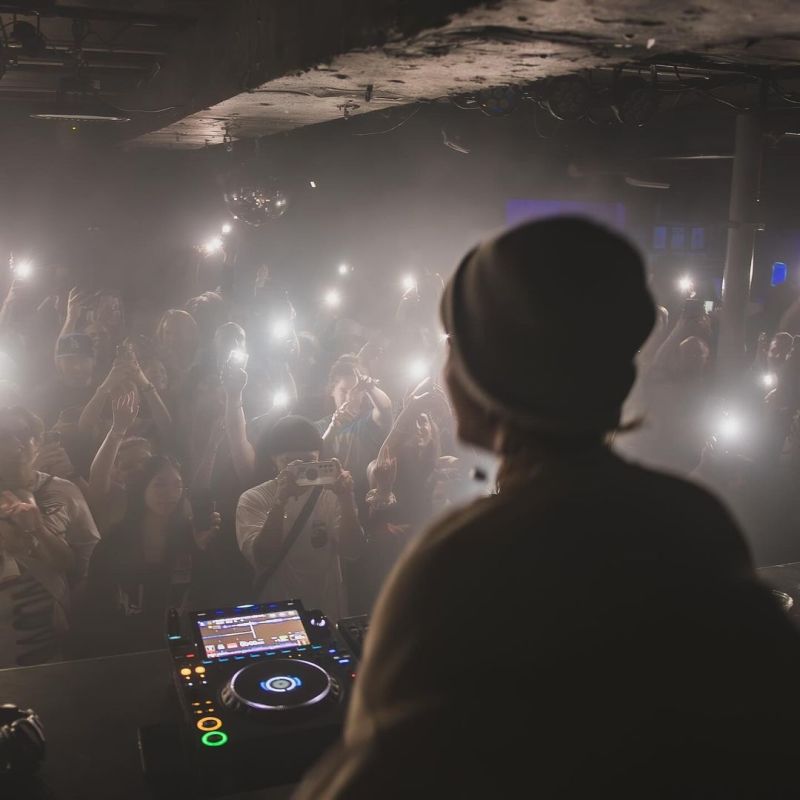
Casper Grey’s relationship with music has been gestating for as long as he can recall. “If you're from London, it's always omnipresent – you can't avoid it,” he tells me.
Grey came of age in the early to mid-00s, in a musical landscape he reckons was “probably at its most experimental”, among the likes of M.I.A and producer Switch. “You can't tell me what genre that is,” he says of the pair's collaboration, which eventually gave the world "Boyz". “Same with Mr. Cage and Dizzee, and a lot of the early grime stuff was like, ‘okay, within this limitation, express yourself!” he explains. “And that's why Rough Squad sounds so different to Jon E Cash, which sounds so different to Cave, sounds so different to Genius or whoever. It was a narrow format, but within that, you could then express yourself and make stuff quite quickly.”
Grey was also alerted to the pop landscape, particularly Christina Aguilera’s Rottweiler-produced “Dirty”. “Listen to that instrumental on its own,” he enthuses. “It's just an industrial, psychopathic beat. There's no world in which that should be underneath Christina Aguilera, but it was, and those things kept happening. Weird Timbaland beats, or weird trip-hop, Radiohead stuff, Massive Attack, or Burial, or Aphex Twin. What are those artists? Essentially, when you come down to it, you're just channelling an emotion with the tools that you have.”
Casper Grey isn’t his real name. That’s saved for government officials and close friends and family. Instead, Grey is a persona of sorts that allows the born-and-raised Londoner to embellish his life, to wear the brooding metaphorical mask: “My real long Irish name, which has all these silent letters in it, I don't have to tell anyone that, because that's not for you. I'll give so much to Casper that you won't need it.” He’s currently sat in a nondescript studio, taking a break from hashing out the last bits for his live show ahead of the release of his debut project, JUNGIAN JUNGLIST.

Grey is building the world as he goes, the architecture of an environment he wants to inhabit as opposed to the one he was born into. But for all the fun and games that come with character and world design, it also offers up a chance for reflection. “It also holds the real me accountable,” he says. Whatever comes out in Casper Grey is a subconscious offering. Rather than embellishing the maudlin, he thrashes wildly in the foreboding darkness, wielding it with precise moves. JUNGIAN JUNGLIST is less an album than a dynamic barrage, bristling with anger, frustration, and discomfort. Your own emotions can crackle in the dark depths, Grey offers; they can throw themselves against concrete walls until they disintegrate.
Grey’s first experiences with being emotionally affected by a piece of art are – in a twist of fate – a mirror of his musical epiphany. The first is Kes. Ken Loach's seminal 1969 coming-of-age film feels fitting for the dramatics Grey carries. “It's got so many metaphors for everything in there,” he tells me, “like the inner child, the young boy, his love for this thing that embodies meaning. It gives meaning to his life and embodies beauty and everything. It's the opposite of everything desolate and miserable around him, and he's holding on to it whilst every part of that environment is trying to tear it away from him, and that feeling of trying to hold on to your little flame whilst everyone's trying to rain all over it.”
The other instance is less obvious: a Peter Kay live recording which brought him to tears for a different reason: “He had such unique angles...I think he gets poo-pooed a little bit because he's a working-class oaf character, but I think his perspective, especially in the early days, was absolutely genius.”
Before music, film was Grey’s main focus. It was a screening of Nosferatu at a Leeds film festival that bridged the gap entirely. Presented alongside a live score, the film was first shown with its original music before flipping to a more comedic score for its second play-through. “Everyone was just pissing themselves laughing,” he remembers, “and I had this really big moment where I was in this shitty northern cinema having this profound moment.”
Grey is a student of his craft. He had no early entrance to either film or music via his home life. His only exposure to the stage was karaoke at the local pub. “I'm not one of those people with family members who are musicians,” he says.
His home life was tumultuous, which led to an ability to conceptualise and break through the bullshit of posed reality, as on the early spoken-word project, CRUD. “I was around a lot of drug and alcohol abuse, and all the stuff that comes with that as a child," he explains. “Talking to these people [family, friends, parents], what the constant thing that kept happening was they would often have a different recollection of reality to me, and again, because I was just sober and young and playing football, I'd be interacting [with] these people who would [be] like… it's cognitive dissonance. They believe, or make themselves believe, something that happened to make themselves feel better about whatever they were going through in a moment.”

Having been in this environment "incessantly" – with a particularly blurry montage from the age of 10 up until he left home – Grey obsessed over trying to pinpoint the truth. "I would have that 360 ability to put a puzzle together so that I didn't go crazy around these people who are grown up toddlers throwing up all over themselves and falling over and being ridiculous," he remembers. Likening it to keeping a grip on reality, unlike his sister who it affected more emotionally, he admits, "I went the opposite way and just turned into a psycho."
Being fiercely withdrawn underscores some of his more hardened lines throughout JUNGIAN JUNGLIST. “E-Victim” has Grey spitting “Shut up, you victim” with disdain, while on “Tru’ Say” he whispers “chaos cradles me”, and “AT A LOSS (ATTA BOY!)” features a haunting, croaking distorted voice intimating“I don’t know what love is”. It would be harrowing were it not for Grey consciously owning it amid the brutalist soundscapes and emotionally loaded vignettes of the record.
Grey comes across as a self-taught student. He's swiftly able to drop the production credits or spawning point of any genre or artist that comes up in conversation. It’s perhaps why fusion is such a major aspect in his work and sees him try and marry the likes of jungle and grime with blues melodies. Genre isn’t a concern for Grey – it’s all about the attitude the music portrays: "I think if there was any genre I'd like to be part of, I’d say post-genre just because the definition of the word is limitless.”

Casper Grey is the fumes that radiate upwards from cityscapes, from the everyday stories that go untold – the hurt and heartbreak that are ingrained in endless conveyor belts of forgotten lives. “It's expressing a hyper real version of me, rather than the real me. Because the real me isn't really this spectacular,” he smiles. “But I can make it spectacular by fusing all these things into one kind of channel; we're shooting them through the eye of a needle.”
“That's what art is great for," he continues. "It's truly seeing what someone's perspective is on something, and how weird and wonderful all those perspectives are, and how revelatory they can be to you. All the time, people listen to music or watch films or see a piece of art, and be like, I would have never looked at it like that, or I would have never seen it or thought about it that way.”
With his unique fusion of abrasive sounds and elegant sonic cinematography, Casper Grey's perspective is a brutally beautiful one waiting to be discovered.
JUNGIAN JUNGLIST is out now via Kingdome Records

 2 days ago
3
2 days ago
3


















 English (US) ·
English (US) ·